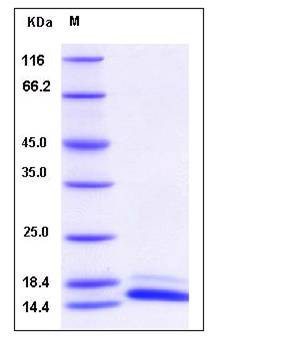Human TCL1A Protein (His Tag)
TCL1
- 100ug (NPP4301) Please inquiry
| Catalog Number | P13176-H07E |
|---|---|
| Organism Species | Human |
| Host | E. coli |
| Synonyms | TCL1 |
| Molecular Weight | The recombinant human TCL1A consisting of 128 amino acids and has a calculated molecular mass of 15.2 kDa. It migrates as an 22 kDa band in SDS-PAGE under reducing conditions as predicted. |
| predicted N | Met |
| SDS-PAGE |  |
| Purity | > 88 % as determined by SDS-PAGE |
| Protein Construction | A DNA sequence encoding the human TCL1A (P56279) (Ala 2-Asp 114) was expressed, with a polyhistide tag at the N-terminus. |
| Bio-activity | |
| Research Area | Immunology |Adaptive Immunity |Costimulation & Costimulatory Molecule |Other Costimulatory Molecules |
| Formulation | Lyophilized from sterile PBS, pH 7.5 1. Normally 5 % - 8 % trehalose and mannitol are added as protectants before lyophilization. Specific concentrations are included in the hardcopy of COA. |
| Background | T-cell leukemia/lymphoma protein 1A (abbreviated for TCL1A) is a member of the TCL1 family. TCL1 protooncogene is expressed in CD3-CD4-CD8- precursor T cells and is extinguished at the CD4+CD8+ stage of thymocyte development. In B cells, TCL1 is first expressed in pro-B cells and remains high in naive mantle zone B cells of peripheral lymphoid tissues. The TCL1 protooncogene is overexpressed in many mature B cell lymphomas, especially from AIDS patients. It has been demonstrated that TCL1 is a powerful oncogene that, when overexpressed in both B and T cells, predominantly yields mature B cell lymphomas. All TCL1 isoforms bind to the Akt pleckstrin homology domain. Both in vitro and in vivo TCL1 increases Akt kinase activity and as a consequence enhances substrate phosphorylation. In vivo, TCL1 stabilizes the mitochondrial transmembrane potential and enhances cell proliferation and survival. It has been shown that TCL1 is a novel Akt kinase coactivator, which promotes Akt-induced cell survival and proliferation. |
| Reference |
